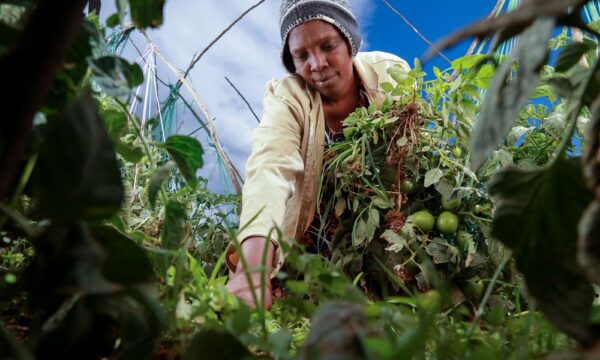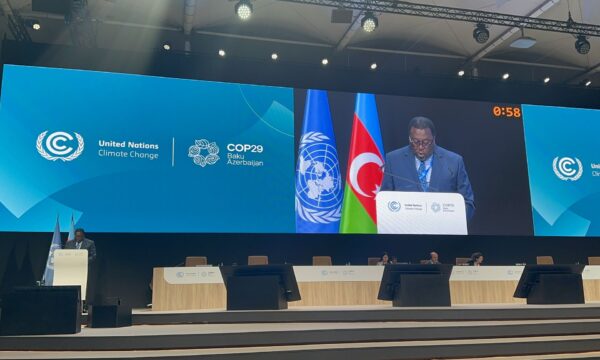CABI envisions a world in which smallholder farmers can confidently face the challenges of climate, delivering ecosystem services for a climate-resilient future. In support of SDG 13: Climate Action, CABI is focused on supporting the uptake of climate smart agriculture.
As such, this year we welcomed a new member of staff, Jonny Casey, as CABI’s first Climate Change Manager. Jonny will be leading our efforts to embed climate action firmly across CABI, and working with our scientists to ensure climate analysis is applied across all our work.
Jonny has previously worked for public, private and non-profit organisations, including Lancaster University, WYG International, and Practical Action. He was worked on climate change policy processes with the UN, and local environmental action projects in the north west of England.
Here we get to know a little more about Jonny.

What motivated you to work in development?
Having worked on local social and environmental issues in Lancaster, UK for a number of years, I was lucky enough to work alongside some wonderful people from across the world at the university, learning about a range of social and environmental challenges. I was really motivated to move into a role which had a more international outlook, trying to create change in wider systems to have a bigger impact for a greater number of people, particularly the most vulnerable.
How have you overcome barriers you’ve faced in your career?
I am sure everyone faces challenges in their lives and careers! I think the best thing for anyone to do is to constantly seek to learn – from colleagues, from listening to people on the frontlines of poverty and climate, from books and digital sources – just always try to find out as much as you can, find alternative points of view, challenge the norm. Coming into a CABI as a political ‘science’ researcher, among mostly plant scientists and social scientists, it’s certainly been a challenge to get up to speed with a lot of the technical terminology often used! But I’ve learned a great deal from my brilliant colleagues already, and hopefully my input, coming from a different perspective, has been useful and a different way of approaching problems.
What has been your biggest achievement so far?
This is probably not my biggest achievement as such, but one thing I’m proud of is running a pioneering reuse project at Lancaster University, which prevented over 500 tonnes of items from going to landfill, instead being reused by students, schools, and charities. It sparked a rethink of the whole waste management system and the university, and it has continued to operate for a decade now. I think it shows how demonstrating a different way of approaching a problem can not only achieve great results, but inspire much wider, systemic change.
What are you looking forward to most about working at CABI?
Agriculture is the sector most vulnerable sector to climate change, particularly for the 800m smallholder farmers worldwide, many relying on rainfall and with limited resources. They are at the frontline of climate change impacts, and most are already facing crop failure, crippling droughts, devastating floods and cyclones, whose frequency and intensity are being driven by global warming. So helping to lead CABI’s work on supporting farmers to adapt to these climate impacts is an opportunity to help avert a climate catastrophe, and work towards a more sustainable, equitable, and prosperous future.
The agriculture sector is also one of the major contributors to greenhouse gas (GHG) emissions globally. The opportunity to work on measures which can mitigate GHGs, and help empower farmers across the world to become part of the solution in climate action is very exciting.
Why is climate change in development work so important?
As I mentioned, smallholder famers are incredibly vulnerable to climate change impacts, and most are trying to survive in situations of extreme poverty. Climate change threatens to undermine development efforts to help lift them out of poverty, reduce hunger, improve yields, etc. It also threatens to plunge millions of people back into poverty, and may lead to mass migration of people as they seek new livelihoods as their home communities become uninhabitable due to climate change – we’re already seeing this in places like Sudan, Nepal, Pacific islands, Honduras. But done smartly, in close collaboration with the communities most affected, work to adapt to climate change in agriculture can bring about enormous benefits beyond improvements in yield – from decreased conflict over natural resources, to new employment opportunities for women and young people. Climate change and development efforts have to work hand in hand for each to be successful in creating a more equal, prosperous and sustainable world.
What are some of the biggest climate change issues in agriculture right now?
One of the major issues is the lack of ‘granular’ data on climate impacts forecast at a farm level in many countries, and in particular ways of presenting that data in formats which are easily understood by farmers, businesses, governments, and really anyone who isn’t a climate scientist. That information is vital for enabling farmers in particular to take the right action in a timely manner to adapt to climate change – to know what types of crops may or may not be suitable in the coming years based on climate projections, the kinds of technologies and practices they may need to implement to avoid the most damaging impacts. These climate information services are going to be one of the key things that CABI works on to support farmers in the coming years. CABI is already running pioneering weather-based information services to warn farmers of the risks of key pests, and how and when to take action, through the PRISE project with the UK Space Agency.
Another big issue is the lack of policy measures which adequately respond to the scale of the adaptation and mitigation challenges in agriculture. For adaptation, it can be challenging for governments to mobile the necessary resources to fund and implement adaptation measures – particularly when the measure of success of adaptation is ultimately that nothing happens (i.e. the climate hazard is avoided), and results are often seen gradually over several years, rather than any immediate change. In a tough political environment with short election cycles, the political motivation for complex adaptation interventions is often lacking. While for mitigation, there are currently few economic and policy incentives to reduce GHG emissions from agriculture, while externalities such as GHGs remain without cost. Policy measures need to both encourage more sustainable practices, for example through regulation, but also help farmers transition to lower GHG production systems. And ultimately, we as consumers need to create the demand for more sustainable produce too.
Finally, there is the issue of uncertainty – a topic I am going to explore more in a future blog! While climate scientists are becoming increasingly accurate in their models of future climate impacts, and in understanding the impacts of measures we can take now to mitigate and adapt, ultimately there remain so many uncertainties about how natural systems will respond to increased CO2 levels and a warming planet, as we’ve never experienced this before. Equally, the models have to be based on anticipated emissions projections over the coming years, something we cannot know for certain. In agriculture, this means there are high degrees of uncertainty about the severity of climate impacts, and how soon they might come about. This makes taking action incredibly challenging, particularly for farmers and governments which are operating with very constrained resources.
To get in touch to discuss CABI’s work on climate change or to partner with CABI, please contact Jonny here.

Related News & Blogs
Biodiversity loss: How can we reclaim our landscapes from threats to biodiversity?
On 22nd May, we mark the International Day for Biological Diversity. In this article, CABI’s Global Director for Invasive Species Dr Hariet Hinz looks at how we can reclaim our landscapes from threats to biodiversity. Biodiversity loss is proceeding at…
22 May 2025




